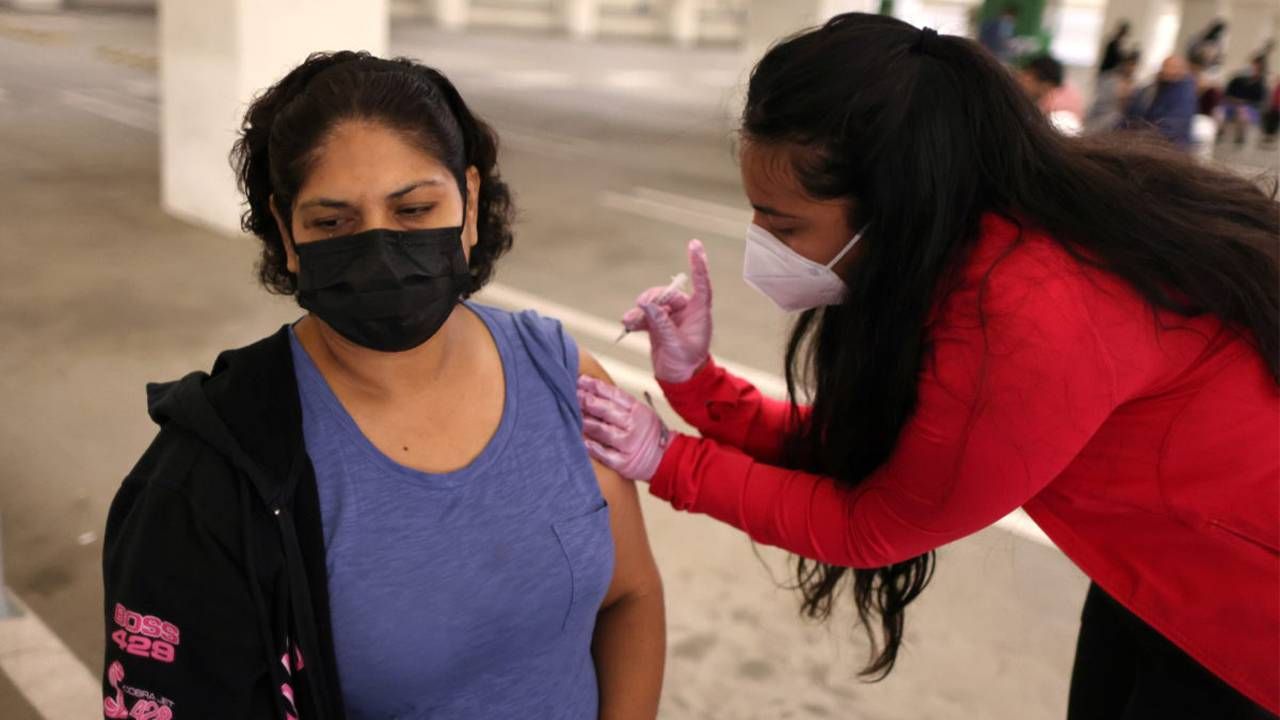Should COVID-19 Vaccines Be Adjusted for Women?
More women have reported COVID-19 vaccine side effects than men. Is a smaller vaccine dose in order?
Everyone who gets vaccinated for COVID-19 is alike in one way: we get the same dose of a product made by Pfizer-BioNTech, Moderna or Johnson & Johnson/Janssen. Who benefits from this "one-shot-fits-all" approach and who is left out?

Disadvantaged populations are still stuck on the periphery of modern medicine: communities of color, women, older adults and others. This is even true with the rollout of COVID-19 vaccines, which may at first glance seem to be beyond bias: it's just a shot in the arm. But the data tell a different story.
"Approximately eighty percent of side effects from the COVID vaccines have been reported by women, especially younger women," said Dr. Saralyn Mark, COVID-19 lead for the American Medical Women's Association.
"Women can do just as well with smaller vaccine doses, which could decrease side effects while still maintaining efficacy and effectiveness."
This self-reported data appears in the Centers for Disease Control and Prevention's (CDC) Morbidity and Mortality Weekly Report.
The physicians' association is now calling for researchers to emphasize age, sex and race as factors that may influence dose responses in COVID-19 vaccine trials.
"It's not enough to just obtain data. It needs to be analyzed and acted upon accordingly," Mark said.
It's still a mystery why there are so many sex-specific differences in the data, from who is more likely to suffer from long-haul COVID-19 (women) to who is more likely to die after being infected with the virus (men).
Our Commitment to Covering the Coronavirus
We are committed to reliable reporting on the risks of the coronavirus and steps you can take to benefit you, your loved ones and others in your community.
Read Next Avenue's Coronavirus Coverage
One theory is that women have remarkable immune systems: their bodies are impressively defensive against microscopic invaders, even in the practice round, fighting with a vaccine.
"Women tend to be more resistant to infections, but once infected, they mount vigorous responses. This may be why men have higher mortality rates due to COVID," Mark said. "Women tend to have more robust immune systems compared to men."
This could mean that women could get by with a lower-dose vaccine. "Women can do just as well with smaller vaccine doses, which could decrease side effects while still maintaining efficacy and effectiveness," Mark said.
If self-reported data shows that the shot is causing more discomfort for some people more than others, it might prompt pharmaceutical companies to adjust their products.
Imagine: a low-dose vaccine for women. Just as effective, but with fewer side effects.
Thank Your Immune System
"I would absolutely get vaccinated again," said Karen, 58, an artist based in Hood River, Ore. (who prefers not to reveal her last name because she is sharing personal medical information). She made a trip to the emergency room three weeks after her J&J COVID-19 shot after becoming concerned about waking up with "tingling down one arm, followed by the other about forty-five minutes later, and it didn't subside for a few hours."
She was concerned about this because of the potentially dangerous blood clots linked to the J&J vaccine. Fortunately, the ER physician said her symptoms weren't related.
Other COVID-19 vaccine considerations for women include menstrual irregularities. There is no evidence to support the claim that these vaccines affect fertility. However, hormones do influence our immune system.
"We have seen that pregnant women have higher mortality rates [from COVID-19]... compared to nonpregnant women." Mark said.
"Twenty-four hours of a fever and sore arm is much better than actually having COVID. I would gladly go through the side effects again to avoid COVID."
Some women have even been told to delay their mammograms.
"One thing I learned was that you should not schedule a mammogram until so many weeks after your last shot, because the shot may cause your lymph nodes to swell," said Kate Walter, a 72-year-old author who lives in Manhattan. "I had a mammogram scheduled for February and postponed it until April."
Fortunately, Walter didn't experience any severe side effects from her shot.
"My only side effect from the Pfizer vaccine was fatigue. After both shots I was tired for about twenty-four to forty-eight hours," she said. "I had much worse side effects from the shingles vaccine. By comparison to the shingles vaccine, the Pfizer vaccine was easy."
Still, sex- and age-related differences may only be part of the story.
"At first I thought women did have stronger side effects, but then my two sons had a rougher time too," said Marian Hollingsworth, 67, a patient safety advocate based in La Mesa, Calif. Hollingsworth says she had chills, a 102-degree fever, fatigue, a sore arm and one "weird side effect" — "very painful" cheekbones (that is, joint pain) — after her second shot of the Moderna vaccine.
"I think I had the worst side effects of any other person I know around my age," she said. "My oldest son (35) had the Moderna shot. He had a fever of a hundred and one and joint pain the second day only," she added.
Hollingsworth's youngest son also experienced side effects from the Pfizer vaccine: chills and severe muscle pain in his upper back. "My daughter and non-binary adult child also had the Pfizer vaccine and had little or no side effects whatsoever," she added.
Get a Shot, File a Report
Women who do experience side effects from a COVID-19 vaccination are advised by experts to do their part and turn that information into data. You might consider asking your doctor to file a formal report with the Vaccine Adverse Event Reporting System (VAERS), a database held by the U.S. Department of Health and Human Services.
Under the law, doctors must report serious negative side effects (called "adverse events") if you experience them within a certain time frame after getting vaccinated. The time frame depends on the side effect and the vaccine.
And even if it's not legally mandated, reporting negative side effects will help researchers know more about how the general public is weathering various vaccines and how to move forward.
You can submit your own "adverse event" report, too — anyone can do it, not just health care professionals. But remember: since this data is self-reported, it's not verifiable. Put another way, it's not possible to fact check the claims made in these reports. And there's no guarantee that any of these reported side effects happened because of vaccines; proving causation (this led to that) isn't possible.
Also, consider who is reporting this data and why: Most people don't go to a government website to report a low-level side effect, like arm pain or fatigue. This means that most events in the database are serious reactions, which can give a lopsided impression. This data isn't perfect — far from it.
And obviously, most side effects from the vaccine are not as terrible as contracting COVID-19.
"My sister was reluctant to get the vaccine, but was convinced to get it by her oncologist, since she had finished breast cancer treatments a year ago. Her husband, though, is still holding out," said Hollingsworth, whose own husband died from cancer last fall. "I spent much of the pandemic trying to protect him from COVID," she remembers. "We also postponed the memorial for my husband so that our friends would not be put at risk."
"Twenty-four hours of a fever and sore arm is much better than actually having COVID," Hollingsworth said. "I would gladly go through the side effects again to avoid COVID."

Read More

